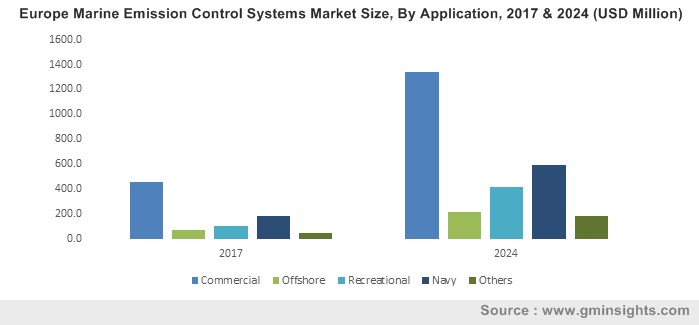A concise synopsis of marine emission control system market with respect to the contribution of industry contenders: global industry to be driven by a strict regulatory spectrum
Publisher : Fractovia | Published Date : 2018-12-12Request Sample
The increasing GHG emissions and a rise in the level of air pollution from ships have been lending a push to marine emission control system market share. Over the last few years, owing to the fact that they are a speedy and cost-effective mode of communication, the preference for waterways and inland transportation has increased remarkably. That said, the surging use of fossil fuel based ships has been emitting a large amount of NOx, SOx, and many other particulate matters, leading to the necessity for emission control systems. The emissions have indeed been contributing to the depletion of the ozone layer which has generated awareness among regulatory bodies, resulting in them mandating strict norms, in order to control the emissions from ships. The on-going deployment of strict regulatory policies to curb the GHG emissions is likely to have a significant impact on the marine emission control system industry size.
Europe Marine Emission Control Systems Market Size, By Application, 2017 & 2024 (USD Million)

The United Nations’ agency, International Maritime Organization (IMO) has been striving for long to promote maritime safety since its establishment. In order to prevent pollution from ships, it has framed suitable ship pollution rules. Based on the type of engines deployed on the ship, the IMO has set standards to limit the NOx as well as Sulphur emissions. The organization has also made several other provisions for preventing air pollution such as mandating norms for controlling ozone depleting substances including halogens and CFCs. The prevalence of a strict regulatory landscape related to air pollution due to the different modes of transportation is poised to accelerate marine emission control system market trends over the years ahead.
In line with the stringent regulatory policies, the players in marine emission control system industry along with renowned marine engine manufacturers have been adopting new design and development strategies. For instance, a few months before, the well-known engine manufacturer, Cummins, revealed workboats, passenger vessels, and tugs that have been manufactured in compliance with strict emissions regulations. The newly launched series of engines also satisfy the standards set by the IMO for tier II and tier III level of vessels operating in the inland and coastal waterways. Cummins has also integrated engine control modules to diagnose and monitor the working of engines and prevent any catastrophic failure.
Another renowned engine manufacturer Moteurs Baudouin also introduced four-stroke diesel engine that fulfils International Maritime Organization’s Tier III and EPA’s Tier 4 requirements. The company claims that the newly developed cleaner engine provides approximately 25 dB noise reduction and 2% reduction in the average fuel consumption without affecting overall power output. The innovative approach adopted by marine engine manufacturers will thus further impel marine emission control system market outlook considerably.
The shifting focus of the shipbuilding companies toward the use of electric energy alternatives over the fossil fuel-based engines will also have a notable impact on the industry growth. On July 2018, Liebherr has launched low-voltage frequency converter system for vessels that can be used for reducing emission and energy consumption. In maritime applications, electrification has been playing a crucial role in decreasing energy consumption. The design of electric drive provides the benefits of high flexibility and offers a wide range of possibilities for layout and integration within a distribution station.
Recently, in 2018, ForSea launched world’s largest emission-free ferries into service at Denmark and Sweden. In cooperation with ABB, ForSea group has accomplished this innovation in the maritime industry with a goal to decarbonize the environment. This project has set a benchmark for other shipbuilding companies which are looking forward to shifting toward eco-friendly ferries services.
On-going changes in the development of marine emission control system will have a significant impact on the market trends over the years ahead. The strict regulatory policies deployed by the government as well as maritime organizations to control the pollution level will further strengthen the marine emission control system industry size. It is profound to mention that the increasing number of research activities related to the development of electric and battery-powered recreational and commercial boats will have a considerable influence on the product demand. For the record, by the end of 2024, marine emission control system market will surpass a revenue collection of USD 14 billion.